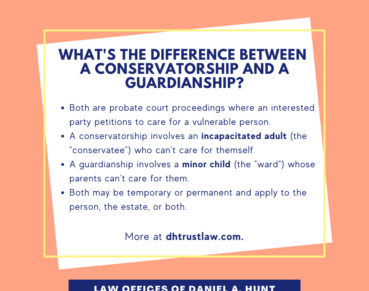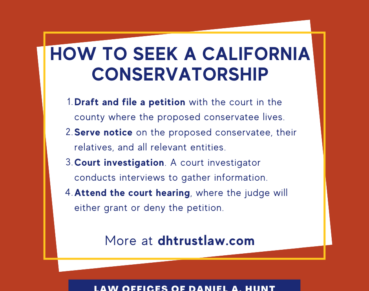Different Types of California Conservatorships

Before seeking a conservatorship for an adult who lacks sufficient capacity to care for themselves, you should understand the different types of California conservatorships available. Evaluating the nature of the conservatee’s needs will help you to determine which type of conservatorship will be the best fit for their needs.
Conservatorship of the Person vs. Estate
A conservatorship consists of two main parts: conservatorship of the person and conservatorship of the estate.
Conservatorship of the person: Focuses on helping the conservatee make decisions about their day-to-day life. Some of these decisions include:
- Where the conservatee will live
- How their personal needs will be met, such as meals, clothing, bathing, etc.
- Where they will receive medical care
- What medical procedures and treatments they will receive
Conservatorship of the estate: Focuses on helping the conservatee make decisions about their assets and financial life. Some of these decisions include:
- Paying the conservatee’s bills
- Collecting income or assets on behalf of the conservatee
- Making or managing investments
However, a conservator of an estate must still seek court approval first before major transactions like purchasing/selling real estate, borrowing money, or gifting assets. A conservator of the estate will also be required to file with the court an accounting of the financial transactions of the estate every other year.
General vs. Limited Conservatorships
The two most common kinds of conservatorships are general and limited.
In a general conservatorship, the proposed conservator usually seeks conservatorship of both the Person and Estate. General conservatorships are most often used for older adults who have lost physical and mental capacity.
In a limited conservatorship, the proposed conservator petitions the court for either conservatorship of the person OR conservatorship of the estate. Limited conservatorships can be useful for those with a developmental disability who only need help managing specific areas of their lives, or for older adults who still have some degree of capacity. If the court grants the limited conservatorship, the conservator will have the power to care for certain duties, but the conservatee will retain all other legal and civil rights.
Temporary (aka “Emergency”) Conservatorship
What happens when a conservatee has immediate needs that can’t wait months for a general conservatorship to be granted? In emergency situations, the court may grant a temporary (or “emergency”) conservatorship. A temporary conservatorship can also be used to fill in gaps when one conservator is removed and a new one hasn’t yet been appointed.
Temporary conservatorships only last for a specific, short period of time, usually 30-60 days. This conservatorship may include the estate, the person, or both.
Of all the types of conservatorships, temporary conservatorships include the most restrictions. For example, a temporary conservator cannot do any of the following without court approval:
- Move the conservatee from their home (except in an emergency)
- Sell the conservatee’s home or give up their rental lease
- Sell or give away estate assets
For expert counsel on which type of conservatorship would work best in your circumstances or assistance seeking a conservatorship, feel free to contact our law firm.
Law Offices of Daniel A. Hunt
The Law Offices of Daniel A. Hunt is a California law firm specializing in Estate Planning; Trust Administration & Litigation; Probate; and Conservatorships. We've helped over 10,000 clients find peace of mind. We serve clients throughout the greater Sacramento region and the state of California.




